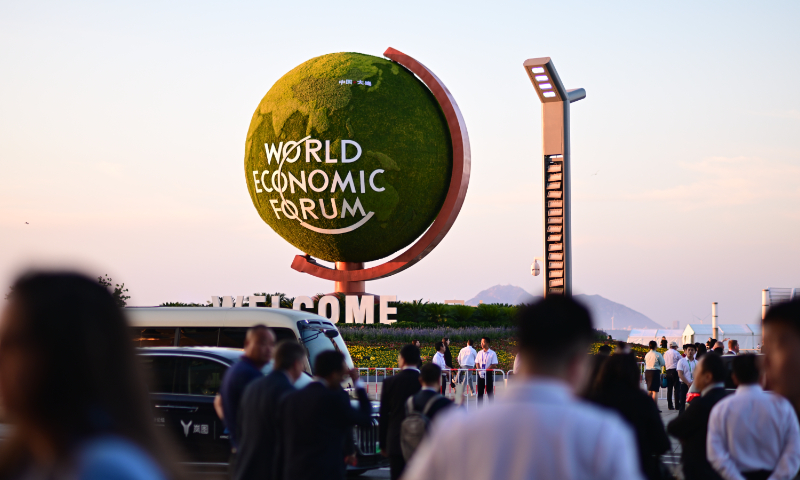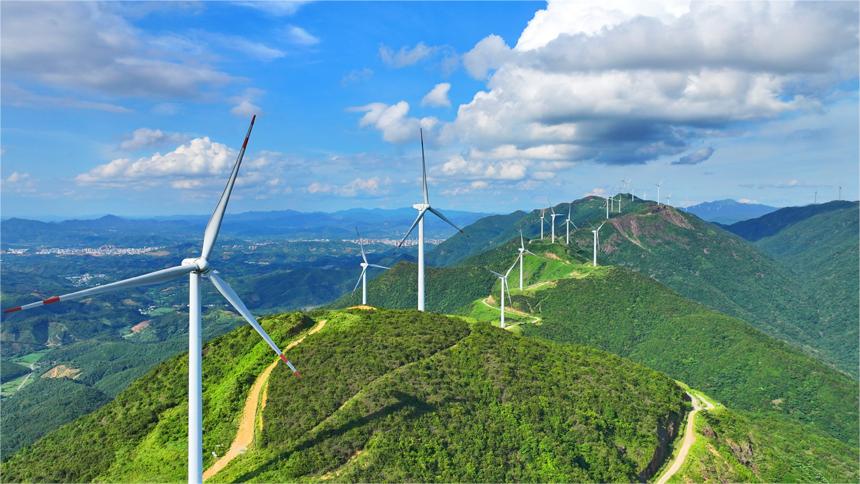Summer Davos concludes, highlighting China's critical role on global stage

Photo taken on June 26, 2024, in Dalian, Northeast China's Liaoning Province shows the venue of the 2024 Summer Davos. (Photo: Tao Mingyang/GT)
The 15th Annual Meeting of the New Champions (AMNC24), also known as the Summer Davos, wrapped up on Thursday with officials, economists, and business leaders from around the world concluding their three-day discussion covering topics spanning from technology, economics, and geopolitics and highlighting China's key role in driving the global economic growth.
At the event, Chinese and international business leaders and scholars hailed "certainties" from China amid a turbulent world and highlighted China's critical role in helping address growing challenges, including the global economic downturn.
The AMNC24, featuring the theme "Next Frontiers for Growth," concluded on Thursday in Dalian, Northeast China's Liaoning Province. It drew the attendance of over 1,600 participants from business, government, civil society, international organizations, and academia from about 80 countries and regions.
As one of the most important international economy-themed forums, the Summer Davos offered the world an opportunity to better understand important trends across various fields, Hu Qimu, a deputy secretary-general of the Digital-Real Economies Integration Forum 50, told the Global Times on Thursday, noting that hot topics during the forum are more likely to become key elements that steer the world's economy growth.
Compared with the first two days' spotlight on specific discussions addressing artificial intelligence (AI), climate change, food, and energy security, panels held on the third day - Thursday - attached more importance to how China could drive the world forward.
Peng Sen, president of China Society of Economic Reform, said on Thursday during a panel discussion named "China Economic Outlook" that China's economy achieved a growth rate of 5.2 percent in 2023, contributing around 30 percent to global growth despite significant pressure, and the growth rate hit a remarkable 5.3 percent in the first quarter of 2024, beyond expectation.
"I'm fully confident that China can achieve its GDP growth goal of around 5 percent. We need high-quality growth in order to stimulate our development and our growth. This depends on the transition, the revolutionary transformation, on the technological front, and as for the traditional sectors, they need an upgrade and they need a deep transformation," Peng said.
Jin Keyu, professor of economics from the London School of Economics and Political Science, said on Thursday at the forum that China is spearheading the structural transformation via electric vehicles (EVs) and solar panels, which was much earlier than most Western economies, adding that China will play an essential role in the global green transition.
Jin noted that "trillions of dollars of investment is needed" for the global green transition, adding that "China is going to play a very essential role" in the transformation.
She highlighted that China's new innovative business models, and the digital economy, accounting for about 40 percent of the country's GDP, are a practical and cost-effective solution to many developing countries' present problems.
When Chinese Premier Li Qiang addressed the opening plenary of the Summer Davos, he emphasized that China has unique comparative advantages to foster new industries, including an ultra-large market with a population of over 1.4 billion, a complete industrial system, abundant human resources, diverse application scenarios, and consumers' high acceptance of new technologies.
"We have the confidence and capability to achieve the growth target of around 5 percent for this year," Li said.
In terms of trade and technology protectionism signs in multilateral cooperation, Premier Li stressed that China will promote inclusive and mutually beneficial development, which was hailed by experts attending the AMNC24.
Following a panel discussion theme with "US-China Relations Analyzed," Li Cheng, professor of political science from the University of Hong Kong, told the Global Times on Thursday that China-US technology cooperation witnessed a rapid falloff over the past few years due to US policies targeting China.
Premier Li said that if countries only think about maximizing their own interests without considering that of others, and even turn back the wheel of history by decoupling and cutting off industrial and supply chains with the "small yard and high fence" policy, it will only raise the cost of global economic operations, sever economic ties between regions and intensify contradictions and disputes.
"China has world-leading scientists and engineers, and US' protectionism and bias may force them back to China and other Asian countries. It is actually not in line with US' interests," Li Cheng noted.
In order to set a stable foundation for economic growth and avoid the impact of global uncertainty, China will foster new quality productive forces by launching a series of key projects covering AI, integrated circuits, and global computing power network to empower traditional technologies, Peng said.
China has seen a steady economic performance so far in 2024, with the country's retail sales of consumer goods hitting 19.52 trillion yuan ($2.69 trillion) from January to May this year, up 4.1 percent year-on-year, according to the National Bureau of Statistics.
Hu noted that China might be the only economy that can drive the world out of its current whirlpool of decline in a peaceful and moderate way.
"The reason why China-related topics are so important and attract much attention is because the world is looking for certainties in China amid soaring global uncertainties," Hu said.
China's economic growth in the second half of 2024 is also a major topic underlined by AMNC24 participants, as Peng noted that stable growth in China will be good news for the world.
"Currently, there are still some challenges facing China's economy, including unreleased domestic consumption potential and global uncertainties. But the country's economy can be greatly boosted through countercyclical policies and new growth momentum generated from new quality productive forces," said Peng.
Regarding the coming third plenary session of the 20th Communist Party of China (CPC) Central Committee scheduled to be held in July in Beijing, Peng projected that there will be more macro-related policies to be released.
Li Cheng said that aside from economic stimulus, China has vast room for conducting urbanization and it might be a new growth engine for China.
Photos
Related Stories
- Commentary: Summer Davos showcases vitality, resilience of Chinese economy
- Global economic trends behind keywords at 2024 Summer Davos
- From AI to new energy, China's emerging industries a boon for the world
- Participants interact during Summer Davos
- Country stepping up efforts for data reforms
- Experts, execs confident in China's growth
Copyright © 2024 People's Daily Online. All Rights Reserved.









